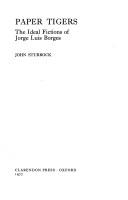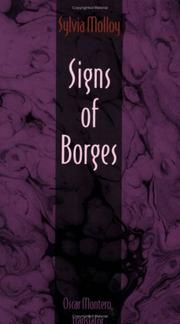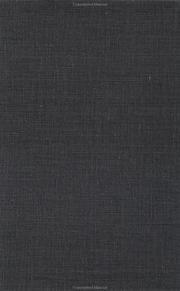| Listing 1 - 10 of 35 | << page >> |
Sort by
|
Book
ISBN: 1947447513 1947447505 9781947447516 Year: 2018 Publisher: Brooklyn, NY punctum books
Abstract | Keywords | Export | Availability | Bookmark
 Loading...
Loading...Choose an application
- Reference Manager
- EndNote
- RefWorks (Direct export to RefWorks)
Tar for Mortar offers an in-depth exploration of one of literature’s greatest tricksters, Jorge Luis Borges. His short story “The Library of Babel” is a signature examplar of this playfulness, though not merely for the inverted world it imagines, where a library thought to contain all possible permutations of all letters and words and books is plumbed by pious librarians looking for divinely pre-fabricated truths. One must grapple as well with the irony of Borges’s narration, which undermines at every turn its narrator’s claims of the library’s universality, including the very possibility of exhausting meaning through combinatory processing. Borges directed readers to his non-fiction to discover the true author of the idea of the universal library. But his supposedly historical essays are notoriously riddled with false references and self-contradictions. Whether in truth or in fiction, Borges never reaches a stable conclusion about the atomic premises of the universal library — is it possible to find a character set capable of expressing all possible meaning, or do these letters, like his stories and essays, divide from themselves in a restless incompletion? While many readers of Borges see him as presaging our digital technologies, they often give too much credit to our inventions in doing so. Those who elide the necessary incompletion of the Library of Babel compare it to the Internet on the assumption that both are total archives of all possible thought and expression. Though Borges’s imaginings lend themselves to digital creativity (libraryofbabel.info is certainly evidence of this), they do so by showing the necessary incompleteness of every totalizing project, no matter how technologically refined. Ultimately, Basile nudges readers toward the idea that a fictional/imaginary exposition can hold a certain power over technology.
Literature and the Internet. --- Borges, Jorge Luis, --- Criticism. --- Internet and literature --- Internet --- Borges, Jorge Luis --- Bustos Domecq, Honorio --- Borges, J. L. --- Borhes, Horhe Luis --- Borkhes, Khorkhe Luyis --- Borches, Chorche Louis --- Bustos Domecq, H. --- Domecq, H. Bustos --- Борхес, Хорхе Луис --- בארכעס, כארכע לויס --- בארכעס, כארכע לויס, --- בורחס, חורחה לואיס --- 博尔赫斯, --- ホルヘ・ルイス・ボルヘス, --- Literary studies: from c 1900 --- -Library of Babel --- Jorge Luis Borges --- technology --- librarianship --- digital humanities --- literary studies --- -Literary studies: from c 1900 --- Library of Babel
Book
ISBN: 080781458X 0807840750 Year: 1981 Publisher: Chapel Hill University of North Carolina press
Abstract | Keywords | Export | Availability | Bookmark
 Loading...
Loading...Choose an application
- Reference Manager
- EndNote
- RefWorks (Direct export to RefWorks)
Borges, Jorge Luis --- Borges, Jorge Luis, --- Criticism and interpretation --- -Criticism and interpretation --- Criticism and interpretation. --- -Bustos Domecq, Honorio --- Bustos Domecq, Honorio --- Borges, J. L. --- Borhes, Horhe Luis --- Borkhes, Khorkhe Luyis --- Borches, Chorche Louis --- Bustos Domecq, H. --- Domecq, H. Bustos --- Борхес, Хорхе Луис --- בארכעס, כארכע לויס --- בארכעס, כארכע לויס, --- בורחס, חורחה לואיס --- 博尔赫斯, --- ホルヘ・ルイス・ボルヘス, --- Borhes, Horhe Luis, --- Borkhes, Khorkhe Luyis, --- Borches, Chorche Louis, --- Борхес, Хорхе Луис, --- בארכעס, כארכע לויס --- Borges Acevedo, Jorge Luis, --- Hao'erhe Luyisi Bo'erhesi, --- 豪尔赫·路易斯·博尔赫斯, --- Būrkhīs, Khūrkhī Lūwis, --- بورخيس, خورخي لويس, --- Suárez Lynch, B.
Book
ISBN: 0050026259 Year: 1973 Publisher: Edinburgh
Abstract | Keywords | Export | Availability | Bookmark
 Loading...
Loading...Choose an application
- Reference Manager
- EndNote
- RefWorks (Direct export to RefWorks)
Borges, Jorge Luis --- Borges, Jorge Luis, --- Bustos Domecq, Honorio --- Borges, J. L. --- Borhes, Horhe Luis --- Borkhes, Khorkhe Luyis --- Borches, Chorche Louis --- Bustos Domecq, H. --- Domecq, H. Bustos --- Борхес, Хорхе Луис --- בארכעס, כארכע לויס --- בארכעס, כארכע לויס, --- בורחס, חורחה לואיס --- 博尔赫斯, --- ホルヘ・ルイス・ボルヘス, --- Borhes, Horhe Luis, --- Borkhes, Khorkhe Luyis, --- Borches, Chorche Louis, --- Борхес, Хорхе Луис, --- בארכעס, כארכע לויס --- Borges Acevedo, Jorge Luis, --- Hao'erhe Luyisi Bo'erhesi, --- 豪尔赫·路易斯·博尔赫斯, --- Būrkhīs, Khūrkhī Lūwis, --- بورخيس, خورخي لويس, --- Suárez Lynch, B.

ISBN: 0198157460 9780198157465 Year: 1977 Publisher: Oxford
Abstract | Keywords | Export | Availability | Bookmark
 Loading...
Loading...Choose an application
- Reference Manager
- EndNote
- RefWorks (Direct export to RefWorks)
Borges, Jorge Luis --- Borges, Jorge Luis, --- Criticism and interpretation --- -Criticism and interpretation --- Criticism and interpretation. --- -Bustos Domecq, Honorio --- Borges, J. L. --- Borhes, Horhe Luis, --- Borkhes, Khorkhe Luyis, --- Borches, Chorche Louis, --- Bustos Domecq, H. --- Domecq, H. Bustos --- Борхес, Хорхе Луис, --- בארכעס, כארכע לויס --- בארכעס, כארכע לויס, --- בורחס, חורחה לואיס --- 博尔赫斯, --- Borges Acevedo, Jorge Luis, --- ホルヘ・ルイス・ボルヘス, --- Suárez Lynch, B. --- Bustos Domecq, Honorio --- Borhes, Horhe Luis --- Borkhes, Khorkhe Luyis --- Borches, Chorche Louis --- Борхес, Хорхе Луис --- בארכעס, כארכע לויס --- Hao'erhe Luyisi Bo'erhesi, --- 豪尔赫·路易斯·博尔赫斯, --- Būrkhīs, Khūrkhī Lūwis, --- بورخيس, خورخي لويس, --- Borges, Jorge Luis, - 1899-1986 - Criticism and interpretation --- Borges, Jorge Luis, - 1899-1986

ISBN: 0822314207 0822314061 0822399946 Year: 1994 Publisher: Durham : Duke University Press,
Abstract | Keywords | Export | Availability | Bookmark
 Loading...
Loading...Choose an application
- Reference Manager
- EndNote
- RefWorks (Direct export to RefWorks)
Available for the first time in English, Signs of Borges is widely regarded as the best single book on the work of Jorge Luis Borges. With a critical sensibility informed by Barthes, Lacan, Foucault, Blanchot, and the entire body of Borges scholarship, Sylvia Molloy explores the problem of meaning in Borges's work by remaining true to the uncanniness that is its foundation.Borges's sustained practice of the uncanny gives rise in his texts to endless tensions between illusion and meaning, and to the competing desires for fragmentation, dispersal, and stability. Molloy traces the movement of Borges's own writing by repeatedly spanning the boundaries of genre and cutting across the conventional separations of narrative, lyric and essay, fact and fiction. Rather than seeking to resolve the tensions and conflicts, she preserves and develops them, thereby maintaining the potential of these texts to disturb. At the site of these tensions, Molloy locates the play between meaning and meaninglessness that occurs in Borges's texts. From this vantage point his strategies of deception, recourse to simulacra, inquisitorial urge to unsettle binarism, and distrust of the permanent--all that makes Borges Borges--are examined with unmatched skill and acuity.Elegantly written and translated, Signs of Borges presents a remarkable and dynamic view of one of the most international and compelling writers of this century. It will be of great interest to all students of twentieth-century literature, particularly to students of Latin American literature.
Borges, Jorge Luis --- Borges, Jorge Luis, --- Criticism and interpretation --- Critique et interprétation --- Critique et interprétation --- Criticism and interpretation. --- LITERARY CRITICISM / Caribbean & Latin American. --- Bustos Domecq, Honorio --- Borges, J. L. --- Borhes, Horhe Luis --- Borkhes, Khorkhe Luyis --- Borches, Chorche Louis --- Bustos Domecq, H. --- Domecq, H. Bustos --- Борхес, Хорхе Луис --- בארכעס, כארכע לויס --- בארכעס, כארכע לויס, --- בורחס, חורחה לואיס --- 博尔赫斯, --- ホルヘ・ルイス・ボルヘス, --- Borhes, Horhe Luis, --- Borkhes, Khorkhe Luyis, --- Borches, Chorche Louis, --- Борхес, Хорхе Луис, --- בארכעס, כארכע לויס --- Borges Acevedo, Jorge Luis, --- Hao'erhe Luyisi Bo'erhesi, --- 豪尔赫·路易斯·博尔赫斯, --- Būrkhīs, Khūrkhī Lūwis, --- بورخيس, خورخي لويس, --- Suárez Lynch, B.
Book
ISBN: 028564713X Year: 1973 Publisher: London Souvenir press
Abstract | Keywords | Export | Availability | Bookmark
 Loading...
Loading...Choose an application
- Reference Manager
- EndNote
- RefWorks (Direct export to RefWorks)
Borges, Jorge Luis, --- Interviews --- Borges, Jorge Luis --- -Interviews --- -Bustos Domecq, Honorio --- Bustos Domecq, Honorio --- Borges, J. L. --- Borhes, Horhe Luis --- Borkhes, Khorkhe Luyis --- Borches, Chorche Louis --- Bustos Domecq, H. --- Domecq, H. Bustos --- Борхес, Хорхе Луис --- בארכעס, כארכע לויס --- בארכעס, כארכע לויס, --- בורחס, חורחה לואיס --- 博尔赫斯, --- ホルヘ・ルイス・ボルヘス, --- Interviews. --- Borhes, Horhe Luis, --- Borkhes, Khorkhe Luyis, --- Borches, Chorche Louis, --- Борхес, Хорхе Луис, --- בארכעס, כארכע לויס --- Borges Acevedo, Jorge Luis, --- Hao'erhe Luyisi Bo'erhesi, --- 豪尔赫·路易斯·博尔赫斯, --- Būrkhīs, Khūrkhī Lūwis, --- بورخيس, خورخي لويس, --- Suárez Lynch, B.
Book
ISBN: 9780521141376 9780521193399 0521193397 0521141370 1107722454 1107720168 0511978863 9780511978869 Year: 2013 Publisher: Cambridge Cambridge University Press
Abstract | Keywords | Export | Availability | Bookmark
 Loading...
Loading...Choose an application
- Reference Manager
- EndNote
- RefWorks (Direct export to RefWorks)
Jorge Luis Borges (1899-1986) was one of the great writers of the twentieth century and the most influential author in the Spanish language of modern times. He had a seminal influence on Latin American literature and a lasting impact on literary fiction in many other languages. However, Borges has been accessible in English only through a number of anthologies drawn mainly from his work of the 1940s and 1950s. The primary aim of this Companion is to provide a more comprehensive account of Borges's oeuvre and the evolution of his writing. It offers critical assessments by leading scholars of the poetry of his youth and the later poetry and fiction, as well as of the 'canonical' volumes of the middle years. Other chapters focus on key themes and interests, and on his influence in literary theory and translation studies.
Borges, Jorge Luis, --- Critique et interprétation --- Criticism and interpretation. --- Borges, J. L. --- Borhes, Horhe Luis, --- Borkhes, Khorkhe Luyis, --- Borches, Chorche Louis, --- Bustos Domecq, H. --- Domecq, H. Bustos --- Борхес, Хорхе Луис, --- בארכעס, כארכע לויס --- בארכעס, כארכע לויס, --- בורחס, חורחה לואיס --- 博尔赫斯, --- Borges Acevedo, Jorge Luis, --- ホルヘ・ルイス・ボルヘス, --- Suárez Lynch, B. --- Borges, Jorge Luis --- Bustos Domecq, Honorio --- Borhes, Horhe Luis --- Borkhes, Khorkhe Luyis --- Borches, Chorche Louis --- Борхес, Хорхе Луис --- בארכעס, כארכע לויס --- Critique et interprétation. --- Hao'erhe Luyisi Bo'erhesi, --- 豪尔赫·路易斯·博尔赫斯, --- Būrkhīs, Khūrkhī Lūwis, --- بورخيس, خورخي لويس,
Book
ISBN: 3319959123 3319959115 Year: 2018 Publisher: Cham : Springer International Publishing : Imprint: Palgrave Macmillan,
Abstract | Keywords | Export | Availability | Bookmark
 Loading...
Loading...Choose an application
- Reference Manager
- EndNote
- RefWorks (Direct export to RefWorks)
This book brings together the work of several scholars to shed light on the Argentine author Jorge Luis Borges' complex relationship with language and reality. A critical assumption driving the work is that there is, as Jaime Alazraki has put it, 'a genuine effort to overcome the narrowness that Western tradition has imposed as a master and measure of reality' in Borges' writing. That narrowness is in large measure a consequence of the chronic influence of positivist approaches to reality that rely on empirical evidence for any authentication of what is 'real'. This study shows that, in opposition to such restrictions, Borges saw in fiction, in literature, the most viable means of discussing reality in a pragmatic manner. Moreover, by scrutinising several of the author's works, it establishes signposts for considering the truly complicated relationship that Borges had with reality, one that intimately associates the 'real' with human perception, insight and language.
Reality in literature. --- Borges, Jorge Luis, --- Bustos Domecq, Honorio --- Borges, Jorge Luis --- Borges, J. L. --- Borhes, Horhe Luis --- Borkhes, Khorkhe Luyis --- Borches, Chorche Louis --- Bustos Domecq, H. --- Domecq, H. Bustos --- Борхес, Хорхе Луис --- בארכעס, כארכע לויס --- בארכעס, כארכע לויס, --- בורחס, חורחה לואיס --- 博尔赫斯, --- ホルヘ・ルイス・ボルヘス, --- Criticism and interpretation. --- Literature, Modern-20th century. --- Postmodernism (Literature). --- Linguistics. --- Twentieth-Century Literature. --- Postmodern Literature. --- Language and Literature. --- Linguistic science --- Science of language --- Language and languages --- Literary movements --- Literature, Modern --- Modernism (Literature) --- Post-postmodernism (Literature) --- Literature, Modern—20th century. --- Philology. --- Stylistics. --- Literature --- Linguostylistics --- Stylistics --- Literary style --- 20th century. --- Style.

ISBN: 0415929180 0415929172 Year: 2002 Publisher: New York (N.Y.): Routledge
Abstract | Keywords | Export | Availability | Bookmark
 Loading...
Loading...Choose an application
- Reference Manager
- EndNote
- RefWorks (Direct export to RefWorks)
Philosophy in literature --- Borges, Jorge Luis, --- Calvino, Italo --- Eco, Umberto --- Borges, Jorge Luis --- Bustos Domecq, Honorio --- Borges, J. L. --- Borhes, Horhe Luis --- Borkhes, Khorkhe Luyis --- Borches, Chorche Louis --- Bustos Domecq, H. --- Domecq, H. Bustos --- Борхес, Хорхе Луис --- בארכעס, כארכע לויס --- בארכעס, כארכע לויס, --- בורחס, חורחה לואיס --- 博尔赫斯, --- ホルヘ・ルイス・ボルヘス, --- Criticism and interpretation. --- Borhes, Horhe Luis, --- Borkhes, Khorkhe Luyis, --- Borches, Chorche Louis, --- Борхес, Хорхе Луис, --- בארכעס, כארכע לויס --- Borges Acevedo, Jorge Luis, --- Hao'erhe Luyisi Bo'erhesi, --- 豪尔赫·路易斯·博尔赫斯, --- Būrkhīs, Khūrkhī Lūwis, --- بورخيس, خورخي لويس, --- Suárez Lynch, B.
Book
ISBN: 143845032X 9781438450322 9781438450315 1438450311 Year: 2014 Publisher: Albany, New York : State University of New York Press,
Abstract | Keywords | Export | Availability | Bookmark
 Loading...
Loading...Choose an application
- Reference Manager
- EndNote
- RefWorks (Direct export to RefWorks)
Expanded edition with new chapters and updates to the translation and bibliography.
Quotation in literature. --- Borges, Jorge Luis, --- Borges, Jorge Luis --- Bustos Domecq, Honorio --- Borges, J. L. --- Borhes, Horhe Luis --- Borkhes, Khorkhe Luyis --- Borches, Chorche Louis --- Bustos Domecq, H. --- Domecq, H. Bustos --- Борхес, Хорхе Луис --- בארכעס, כארכע לויס --- בארכעס, כארכע לויס, --- בורחס, חורחה לואיס --- 博尔赫斯, --- ホルヘ・ルイス・ボルヘス, --- Criticism and interpretation. --- Borhes, Horhe Luis, --- Borkhes, Khorkhe Luyis, --- Borches, Chorche Louis, --- Борхес, Хорхе Луис, --- בארכעס, כארכע לויס --- Borges Acevedo, Jorge Luis, --- Hao'erhe Luyisi Bo'erhesi, --- 豪尔赫·路易斯·博尔赫斯, --- Būrkhīs, Khūrkhī Lūwis, --- بورخيس, خورخي لويس, --- Suárez Lynch, B.
| Listing 1 - 10 of 35 | << page >> |
Sort by
|

 Search
Search Feedback
Feedback About UniCat
About UniCat  Help
Help News
News